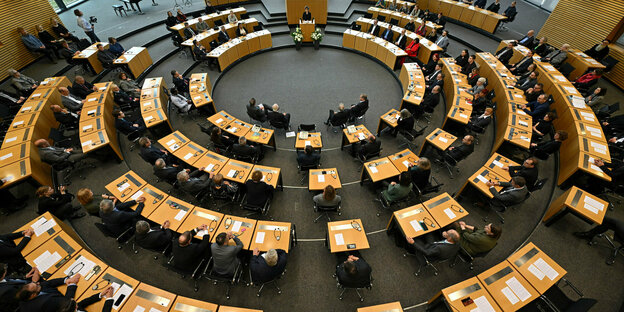The “Thuringia Project” of the constitutional blog offers suggestions for strengthening democracy. Why the AfD will have a harder time with this.

Democracy at risk? View of the Thuringian state parliament Photo: Martin Schutt/dpa
FREIBURG taz | “Only a prepared democracy is a true defensive democracy.” This is how journalist and lawyer Maximilian Steinbeis justified his team's proposals to make preventive legal changes in Thuringia, where a new state parliament will be elected in September. According to current polls, the AfD can expect between 29 and 31 percent of the vote.
Steinbeis is the founder of the Constitution Blog, where constitutional issues have been debated since 2009. A year ago, Steinbeis founded the “Thuringia Project”, in which he and ten employees investigated how the AfD could endanger democracy and the state. of law in Thuringia after an electoral victory and how politicians should avoid it beforehand or at least make it clearer. difficult. The Thuringia Project has now presented a policy document with seven recommendations. By the way, the newspaper never talks about “AfD”, but always about an “authoritarian-populist” party. But of course everyone knows who he means.
The Thuringia Project does not make any recommendations on what should be done if the AfD wins an absolute majority in Thuringia and then starts passing racist laws or hindering the opposition in elections and demonstrations. The Thuringia Project proposals start earlier, when the AfD does not yet have an absolute majority, but can block certain decisions with more than a third of the seats in the regional parliament. Or if the AfD becomes part of a coalition government and appoints individual ministers or even the prime minister.
For example, AfD ministers could temporarily retire political officials without justification. The president of the state of Thuringia, Björn Höcke, has already announced that he would like to replace Stephan Kramer, president of the Thuringian state office for the protection of the Constitution. Until now, a Thuringian Interior Minister could easily do this.
political officials
The Thuringia Project now proposes to remove the police chief and the president of the Office for the Protection of the Constitution from the list of political officials in Thuringia. Incumbents could no longer be fired without justification. If the proposal were implemented, it could of course backfire. If a Thuringian police chief becomes radicalized after his appointment, he cannot be dismissed so easily by an SPD or CDU interior minister.
Another example: Currently, a Thuringian Prime Minister can terminate state contracts without the state parliament having to agree. In this way, Prime Minister Höcke could terminate the general state broadcasting agreements or the state agreement on central German broadcasting (MDR) and thus remove Thuringia from the public media association.
The Thuringia project proposes that the termination of state contracts is only possible with the consent of the federal parliament in Erfurt. If the AfD governs alone, that would not be a major obstacle, and in a coalition between the AfD and the CDU or BSW, many things that were previously considered unthinkable would certainly be possible.
The Thuringia Project proposals generally do not provide for absolute stop signs because they would be difficult to justify constitutionally. If a party wins the election, this should be reflected in the corresponding policies. Most of the time, the project only wants to slightly increase the obstacles to politically sensitive changes.
It can be changed
For example, the State Center for Civic Education should be regulated by law for the first time, the Thuringia Project recommends. So the next Thuringian state government could not simply abolish it or give it a new German national mandate. To be sure, an AfD-led state parliamentary majority could amend a corresponding law again after the state elections.
The bill also aims to ensure the functioning of the state constitutional court, prohibit consultative referendums by the state government and remove ambiguities in the state constitution regarding the election of the prime minister.
Of course, constitutional changes require a two-thirds majority in the Erfurt regional parliament.
